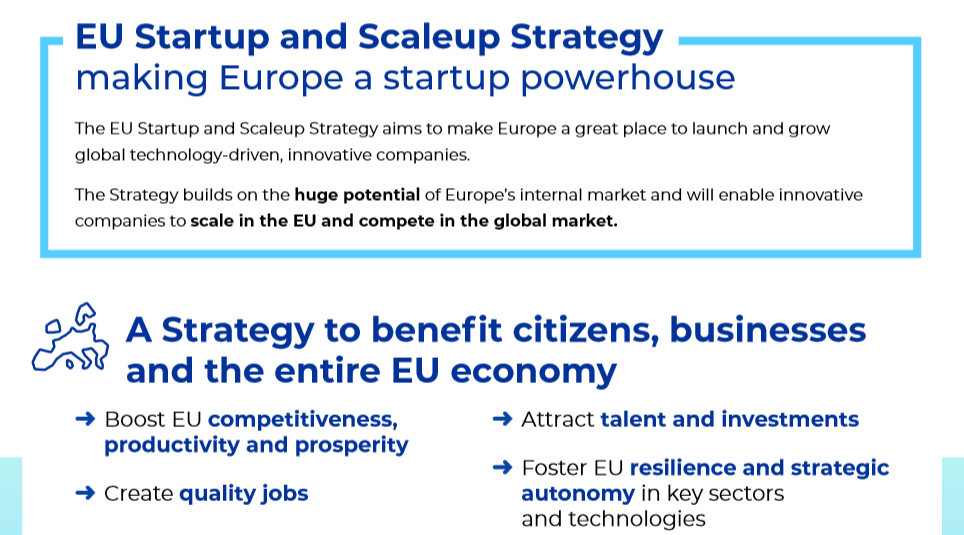The Commission has put startups, research and innovation among the key priorities of its mandate, with the goals of closing the innovation divide between the EU and its global competitors and boosting competitiveness, bearing in mind the Letta Report on the future of the Single Market and the Draghi Report on European competitiveness.
The Strategy proposes a comprehensive set of actions to make the EU the best place in the world to launch and grow technology-driven innovative companies: https://research-and-innovation.ec.europa.eu/document/download/2f76a0df-b09b-47c2-949c-800c30e4c530_en?filename=ec_rtd_eu-startup-scaleup-strategy-communication.pdf
It focuses on helping innovators, founders and investors to Choose Europe by improving the conditions for startups and scaleups, enabling them to capitalise on new geopolitical opportunities and reducing the reasons to relocate outside the EU. It sets out legislative, policy and financial support measures, at both EU and Member States level, to address the needs of innovative companies throughout their development.
Key actions are focused on fostering innovation-friendly regulation, improving access to finance, accelerating market uptake and expansion, attracting and retaining the best talent and facilitating access to infrastructure, networks and services.
26 Actions have been defined in 5 main areas:
- Fostering innovation-friendly environment: As outlined in the Single Market Strategy, startups and scaleups need less fragmentation, fewer administrative burdens, as well as rules that are simpler and more supportive across the Single Market. The Commission will propose a European 28th regime to simplify rules and reduce the cost of failure by addressing critical aspects in areas like insolvency, labour and tax law. The European Business Wallet will enable seamless digital interactions with public administrations across the Union through a unified digital identity for all economic operators. The forthcoming European Innovation Act will further support innovation by promoting regulatory sandboxes.
- Driving better financing: Startups and scaleups need better funding, a larger and more integrated EU venture capital (VC) market and greater involvement of European institutional investors. The Savings and Investments Union initiative will be key to unlocking more financing and investment opportunities in the EU. To complement this initiative, the Strategy aims to expand and simplify the European Innovation Council, deploy a Scaleup Europe Fund to help bridge the financing gap of deep tech scale-up companies, and develop a voluntary European Innovation Investment Pact to mobilise large institutional investors to invest in EU funds, venture capital funds and unlisted scaleups.
- Supporting market uptake and expansion: Startups and scaleups need a quicker journey from lab to market. The Strategy introduces a Lab to Unicorn initiative, which includes the European Startup and Scaleup Hubs to help connect university ecosystems across the EU. This includes a blueprint for licensing, royalty and revenue-sharing and equity participation for academic institutions and their inventors when commercialising intellectual property (IP) and creating spinoffs, along with guidance on State aid IP-related rules.
- Attracting and retaining top talent: To keep and attract top talent, startups and scaleups need better access to highly skilled individuals. The Strategy introduces the Blue Carpet initiative, notably focusing on entrepreneurial education, tax-related aspects of employee stock options and cross-border employment. The Commission will also promote the Blue Card Directive and encourage Member States to put in place a fast-track schemes for non-EU founders.
- Facilitating access to infrastructure, networks and service: Startups and scaleups need a shorter time-to-market and quicker commercialisation. The Strategy proposes to simplify and harmonise diverging access and contractual conditions for startups and scaleups to technology and research infrastructures through a Charter of Access for industrial users.
Particularly mportant is the are of Research Infrastructures (RIs) which are facilities that provide specialised resources and
services primarily for research communities. They typically consist of large-scale laboratories with significant operating budgets, although some RIs exist entirely in digital form, such as archives for the social sciences.
Key Barriers identified include:
- Limited access to research and technology infrastructures
- Limited access to data and fragmented support mechanisms
- Access to knowledge and knowledge valorisation
- Weak commercialisation of results/academic inventions
- Lack of resources and skills of knowledge and technology transfer offices (TTOs)
- Fragmented university support for startup creation
- Limited financial and non-financial commercialisation incentives for researchers
- Hurdles for spinoff/startups access to IP and knowledge
For more information, please refer to the source pages of this announcement: https://ec.europa.eu/commission/presscorner/detail/en/ip_25_1350 and https://research-and-innovation.ec.europa.eu/strategy/strategy-research-and-innovation/jobs-and-economy/eu-startup-and-scaleup-strategy_en

